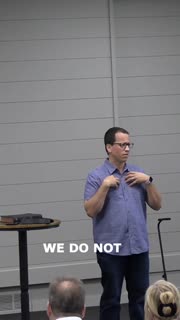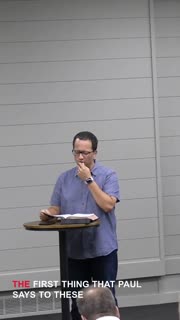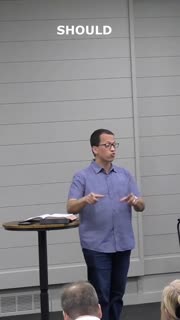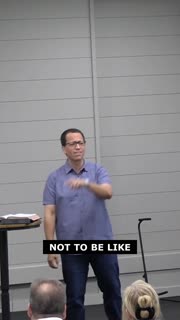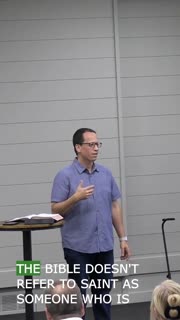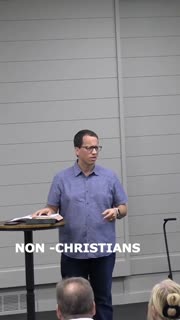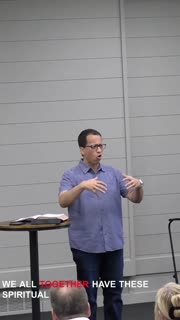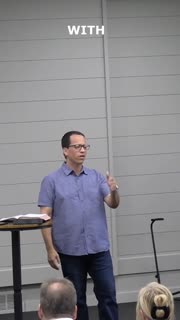Embracing Our Identity and Gifts in Christ
Summary
### Summary
In today's sermon, we delved into the issues faced by the early church in Corinth, as addressed by the Apostle Paul in his letter to them. The church was plagued by disunity, immorality, and the misuse or neglect of spiritual gifts. Paul, despite being deeply troubled by these reports, begins his letter not with condemnation but with a reminder of their identity in Christ. He emphasizes that they are sanctified, set apart for God's purposes, and endowed with spiritual gifts meant to build up the church community.
Paul's approach is instructive for us today. He starts with gratitude, thanking God for the gifts bestowed upon the Corinthians, even though they were misusing them. This gratitude sets the tone for addressing the issues, reminding the Corinthians of their calling and the grace they have received. Paul underscores that every believer is gifted by God, not for personal gain but for the edification of the church. These gifts are to be used continuously until Christ returns, emphasizing the eternal perspective that should guide our earthly actions.
The sermon also highlighted the importance of being different from the world. As Christians, our lives should reflect the transformation brought about by Jesus, making us distinct in our love, kindness, and joy. This difference is not to isolate us but to draw others to Christ. We are called to use our spiritual gifts actively, regardless of our life stage, to support and grow the church community. The ultimate goal is to eagerly await Christ's return, living in a way that honors Him and builds up His body, the church.
### Key Takeaways
1. Identity in Christ: Paul begins by reminding the Corinthians of their sanctified status in Christ. Being sanctified means being set apart for God's purposes, which should reflect in our daily lives. This identity calls us to live differently, showing love, kindness, and joy that stand out in a world often devoid of these qualities. [08:45]
2. Gratitude Before Correction: Paul starts his letter with gratitude, thanking God for the spiritual gifts given to the Corinthians. This approach teaches us to focus on God's grace and the positive aspects of our community before addressing issues. It sets a tone of humility and thankfulness, which is crucial for constructive correction. [24:49]
3. Active Use of Spiritual Gifts: Every believer is endowed with spiritual gifts meant for the edification of the church. These gifts are not for personal gain but for building up the body of Christ. We are called to use these gifts actively, regardless of our life stage, to support and grow our church community. [33:10]
4. Eternal Perspective: Paul reminds the Corinthians that their ultimate goal is the return of Christ. This eternal perspective should guide our actions and priorities, helping us to focus on what truly matters. We are to use our gifts and live our lives in a way that eagerly anticipates Christ's return. [36:10]
5. Being Different for a Purpose: Our distinctiveness as Christians is not to isolate us but to draw others to Christ. Our transformed lives should make people curious about the source of our joy, love, and kindness, providing opportunities to share the gospel. This difference is a testimony to the transformative power of Jesus. [18:24]
### YouTube Chapters
[0:00] - Welcome
[01:19] - The Troubled Church
[02:26] - Paul's Mission and Message
[03:24] - Paul's Letter from Ephesus
[04:18] - Disunity and Immorality in Corinth
[04:52] - The Scalpel of God's Word
[05:34] - Opening of Paul's Letter
[06:10] - Paul's Loving Approach
[06:52] - Introduction of Sosthenes
[08:07] - Sanctified and Set Apart
[09:52] - The Meaning of Being a Saint
[10:58] - Special Teacups and Homecoming Dresses
[13:02] - Called to Be Different
[15:09] - Embracing Our Difference
[17:30] - Filtering Our Actions
[19:20] - Gifted by God
[21:06] - Spiritual Gifts in the Church
[24:49] - Gratitude for God's Gifts
[28:20] - Using Spiritual Gifts for Growth
[33:10] - No Excuses for Not Using Gifts
[36:10] - Awaiting Christ's Return
[39:33] - Set Apart but Not to Sit Around
Study Guide
### Bible Study Discussion Guide
#### Bible Reading
1. 1 Corinthians 1:1-9 (CSB)
#### Observation Questions
1. What were the main issues Paul addressed in the church at Corinth? [01:19]
2. How does Paul begin his letter to the Corinthians, and why is this significant? [06:10]
3. What does it mean to be "sanctified in Christ Jesus" according to Paul? [09:17]
4. How does Paul describe the purpose of spiritual gifts in the church? [21:30]
#### Interpretation Questions
1. Why does Paul start his letter with gratitude despite the serious issues in the Corinthian church? [24:49]
2. What does it mean to have an "eternal perspective," and how should this influence our daily actions? [36:10]
3. How can the distinctiveness of Christians serve as a testimony to others? [18:24]
4. What are the implications of being "set apart" for God's purposes in our modern context? [09:52]
#### Application Questions
1. Paul emphasizes the importance of gratitude before correction. How can you incorporate this approach in your interactions within the church community? [24:49]
2. Reflect on your spiritual gifts. Are you actively using them to build up the church? If not, what steps can you take to start using them? [33:10]
3. How can you maintain an eternal perspective in your daily life? What practical steps can you take to remind yourself of Christ's return? [36:10]
4. In what ways can you demonstrate the distinctiveness of a Christian life in your workplace or community? [18:24]
5. Think of a time when you felt isolated because of your faith. How can you turn that experience into an opportunity to draw others to Christ? [18:24]
6. Identify one area in your life where you can show more love, kindness, or joy. What specific action will you take this week to reflect your identity in Christ? [09:17]
7. How can you encourage others in your small group to use their spiritual gifts? What role can you play in fostering a supportive environment for this? [33:10]
Devotional
Day 1: Embracing Our Sanctified Identity
Description: The Apostle Paul begins his letter to the Corinthians by reminding them of their sanctified status in Christ. Being sanctified means being set apart for God's purposes, which should reflect in our daily lives. This identity calls us to live differently, showing love, kindness, and joy that stand out in a world often devoid of these qualities. Paul’s reminder is not just a theological statement but a call to action, urging believers to embody the transformation that Jesus brings into their lives. This transformation should be evident in how we interact with others, make decisions, and prioritize our lives.
Living out our sanctified identity means that our actions, words, and attitudes should reflect the character of Christ. It’s a daily commitment to live in a way that honors God and draws others to Him. This distinctiveness is not about being self-righteous or isolated but about being a living testimony of God’s grace and love. As we embrace our identity in Christ, we become beacons of hope and light in a world that desperately needs it. [08:45]
1 Peter 2:9 (ESV): "But you are a chosen race, a royal priesthood, a holy nation, a people for his own possession, that you may proclaim the excellencies of him who called you out of darkness into his marvelous light."
Reflection: How can you show love, kindness, and joy in a specific situation today that will make your identity in Christ evident to others?
Day 2: Gratitude Before Correction
Description: Paul’s approach to addressing the issues in the Corinthian church is instructive. He starts his letter with gratitude, thanking God for the spiritual gifts given to the Corinthians, even though they were misusing them. This approach teaches us to focus on God's grace and the positive aspects of our community before addressing issues. It sets a tone of humility and thankfulness, which is crucial for constructive correction. By acknowledging the good first, Paul creates an environment where correction can be received more openly and effectively.
Gratitude before correction is a powerful principle that can transform our relationships and communities. When we start with gratitude, we acknowledge the work of God in others and in our circumstances. This perspective helps us to see beyond the problems and recognize the potential for growth and improvement. It also fosters a spirit of humility and respect, making it easier to address issues in a way that builds up rather than tears down. [24:49]
Colossians 3:15-16 (ESV): "And let the peace of Christ rule in your hearts, to which indeed you were called in one body. And be thankful. Let the word of Christ dwell in you richly, teaching and admonishing one another in all wisdom, singing psalms and hymns and spiritual songs, with thankfulness in your hearts to God."
Reflection: Think of a situation where you need to address an issue with someone. How can you start with gratitude to set a positive tone for the conversation?
Day 3: Active Use of Spiritual Gifts
Description: Every believer is endowed with spiritual gifts meant for the edification of the church. These gifts are not for personal gain but for building up the body of Christ. Paul emphasizes that these gifts should be used actively, regardless of our life stage, to support and grow our church community. The misuse or neglect of these gifts can lead to disunity and stagnation within the church. Therefore, it is crucial for each believer to recognize their gifts and use them for the common good.
Using our spiritual gifts actively means being intentional about serving others and contributing to the life of the church. It involves recognizing the unique ways God has equipped us and stepping out in faith to use those gifts. Whether it’s teaching, serving, encouraging, or any other gift, each one is vital for the health and growth of the church. By using our gifts, we not only fulfill our calling but also help others to grow and flourish in their faith. [33:10]
1 Corinthians 12:4-7 (ESV): "Now there are varieties of gifts, but the same Spirit; and there are varieties of service, but the same Lord; and there are varieties of activities, but it is the same God who empowers them all in everyone. To each is given the manifestation of the Spirit for the common good."
Reflection: What spiritual gift has God given you, and how can you use it actively to serve your church community this week?
Day 4: Living with an Eternal Perspective
Description: Paul reminds the Corinthians that their ultimate goal is the return of Christ. This eternal perspective should guide our actions and priorities, helping us to focus on what truly matters. When we live with an eternal perspective, we are less likely to be swayed by temporary concerns and more focused on what has lasting value. This mindset helps us to prioritize our time, resources, and efforts in ways that honor God and advance His kingdom.
Living with an eternal perspective means that we view our lives through the lens of eternity. It affects how we make decisions, how we handle challenges, and how we interact with others. It reminds us that our ultimate hope is not in this world but in the promise of Christ’s return. This perspective gives us the strength to persevere, the wisdom to make godly choices, and the motivation to live in a way that reflects our faith. [36:10]
2 Corinthians 4:17-18 (ESV): "For this light momentary affliction is preparing for us an eternal weight of glory beyond all comparison, as we look not to the things that are seen but to the things that are unseen. For the things that are seen are transient, but the things that are unseen are eternal."
Reflection: How can you shift your focus from temporary concerns to eternal priorities in a specific area of your life today?
Day 5: Being Different for a Purpose
Description: Our distinctiveness as Christians is not to isolate us but to draw others to Christ. Our transformed lives should make people curious about the source of our joy, love, and kindness, providing opportunities to share the gospel. This difference is a testimony to the transformative power of Jesus. Being different for a purpose means that our lives should be a reflection of God’s love and grace, making others want to know more about Him.
Being different for a purpose involves living in a way that stands out in a positive and attractive manner. It’s about being intentional in our actions and attitudes, so that others can see the difference that Christ makes in our lives. This distinctiveness is not about being perfect but about being authentic and consistent in our faith. It’s about letting our light shine in a way that draws others to the source of that light, which is Jesus. [18:24]
Matthew 5:14-16 (ESV): "You are the light of the world. A city set on a hill cannot be hidden. Nor do people light a lamp and put it under a basket, but on a stand, and it gives light to all in the house. In the same way, let your light shine before others, so that they may see your good works and give glory to your Father who is in heaven."
Reflection: In what specific ways can you let your light shine today to draw others to Christ? How can your actions and attitudes reflect the love and grace of Jesus?
Quotes
1. "We do not approach 1 Corinthians and say, Well, those people were terrible. I'm glad I'm not that bad. That's not how God uses his word. Instead, it takes a scalpel to our hearts. To our consciences. And shows us how we also are led astray. Over the next several weeks, all the way into the early part of next year, we're going to slowly but surely dig into 1 Corinthians and see these challenges, but see God's remedy for these challenges." [04:52] (33 seconds)
2. "The first thing that Paul says to these sisters and brothers in Corinth is a reminder that God's people are set apart. God's people are set apart. God's people are called to be different than the people around them. There should be something that is so radically different about us as followers of Jesus that the people around us say, what is it with you? And not in a bad way, in a good way. Why are you loving? Why are you kind? Why are you patient? Why do you always have so much joy?" [08:45] (36 seconds)
3. "We should be different than the people around us because of the transformation that has gone on in our hearts because of Jesus. Paul reminds these Corinthian people that this is who they are when he says, you are sanctified in Christ Jesus. You see this in verse 2. You are sanctified in Christ Jesus. Called as saints is how Paul describes it. To be sanctified, just for clarity, to be sanctified or a saint describes how we're called to be different. We are not like the rest of the world. We are striving to be holy as God is holy. We are set apart. We are different." [09:17] (47 seconds)
4. "You are not to be like everyone else. As he goes through this letter, he's going to show them how they are acting like everyone else. They're engaged in the same kind of behavior, same kind of activities. In some respects, it's even worse. But he begins by reminding them, you are sanctified. Set apart. You're a saint. Which is not a word that we usually ascribe to ourselves. When we think of saints, we think specifically of the Orthodox Church or the Catholic Church that have certain people who are set apart as saints." [13:02] (38 seconds)
5. "The Bible doesn't refer to saint as someone who is extraordinary, someone who's better than everyone else. That's how we think of it in our culture. That's why we don't like the term saint. Saint applied to us. But that's not how the Bible uses it. The Bible says you, as followers of Jesus, are called to be different. God is going to equip you for His purposes. He is going to set you apart from the culture so that you're not doing the things that the culture is doing. This can be difficult for us because it can feel weird to us, and yet I'm convinced it's a good kind of weird." [14:33] (44 seconds)
6. "We don't need to dabble in them just so we look contemporary or hip or relevant to the people around us. We don't have to do that. If it dishonors the Lord, then we as God's set apart people should stay away from these things and never look back and not be afraid and not be ashamed. We should run everything through that filter. Does it honor the Lord? Then I'll engage with it. Does it dishonor the Lord? Then I'm staying away from it. And it's just that simple." [17:30] (34 seconds)
7. "Non-Christians should see us and say, what is it with you? And have that be a positive. How can you be so patient? How can you be so kind? How can you be so loving? How can you always think the best about others around you? How can you do this? Where does your joy come from? And the reason why we want them to see that is so that then we can say it's from Jesus. It's not because I'm extra good. It's not because I'm a saint the way the world defines sainthood. It's because God's at work in my life and He's the one who's making these changes in me." [18:24] (37 seconds)
8. "We all together have these spiritual gifts given by God to support this church body. And Paul's response is to thank the Lord for them. This is fascinating because as I've said earlier, Paul knows what's going on in this church. He knows about all their problems. There's going to be times later on in 1 Corinthians where even though it's written, you're going to be able to hear Paul sort of yelling off the page as he talks to these people. You're going to tell he's whipped up and he's righteously angry about what these people are doing." [23:19] (41 seconds)
9. "Paul begins with thanks. He begins with the positive. He reminds them of who they are in Christ. And he does it through a message about how he thanks God for what he has done. For the fact that he's the one who has equipped these people just like he has equipped each and every one of us. The author Craig Blomberg, speaking about Paul's thanksgiving here, says our focus on God's strength rather than human frailty and on what's going right more than on what's going wrong should lead us to outbursts of praise to God for his grace and faithfulness." [24:12] (47 seconds)
10. "We need to focus on what's going right in Christian circles before getting to what's going wrong. I don't know about you, but that cuts me a little bit. And Paul doesn't begin right off the bat like I might have with, He doesn't begin that way. He begins with, I praise almighty God because through Jesus Christ he has given you everything that you need, every spiritual gift, everything that it takes to love each other and express patience toward one another and to build each other up and to lead each other to be more like Jesus." [25:24] (46 seconds)
